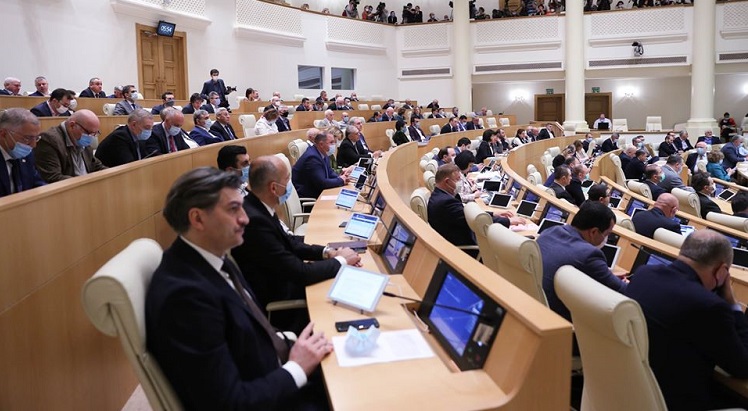Parliament to approve changes to electoral code, including gender quotas, party funding

The amendments will need the support of at least 76 MPs in the 150-member parliament. Photo: parliament of Georgia press office.
The Georgian parliament is discussing amendments to the country’s electoral code which come following the adoption of the election bill on June 29.
Ruling party MPs say that the amendments they have proposed include ‘most of the OSCE/ODIHR recommendations’.
The amendments concern the formation of an election administration, media campaigning and broadcasting, the election environment, the prevention of the inappropriate usage of administrative resources, election disputes, party funding, gender quotas and second rounds of elections.
Per the amendments:
- Non-partisan members of lower-level (precinct) election commissions will be elected with the support of the majority of non-partisan members of the relevant district election commissions which will ensure that the process is conducted impartially and free from party interests.
- Family members will not be employed in the same precinct election commission to prevent conflicts of interests.
- Individuals appointed by a party to precinct election commissions during previous elections will not be able to become non-partisan members of the commissions during the 2020 elections.
- One party/bloc will not be able to use its commercial time for the interests of other political parties or blocs.
- Giving more than the specified free or paid TV time for parties or blocs will be considered an illegal contribution.
 Georgia to hold parliamentary elections at the end of October 2020. Photo: Nino Alavidze/Agenda.ge.
Georgia to hold parliamentary elections at the end of October 2020. Photo: Nino Alavidze/Agenda.ge.
- Posting of campaign materials within 25 meters from the polling station will be banned.
- Unproved income will be considered an illegal contribution.
- Public school teachers, members of religious organisations and the bar association will be banned from election campaigning.
- Ministries and other state bodies will be banned from placing commercials on implemented projects two months before election day.
- Before the 2028 parliamentary elections, parties and election blocs must present party lists in which one-fourth of candidates will be a woman. Otherwise the party will not be registered.
- For the 2028 parliamentary elections themselves, one-third of party lists must consist of women, while this proposition will increase for the 2032 race.
- If a party receives 50,000 votes in the elections (three per cent of the total vote) the party will receive 15 lari for a single vote in state funding – a total of 750,000 GEL.
- For each vote after 50,000 votes, the party will receive 5 GEL.
- Parties with more gender-balanced election lists will receive additional state funding.
 Tweet
Tweet  Share
Share